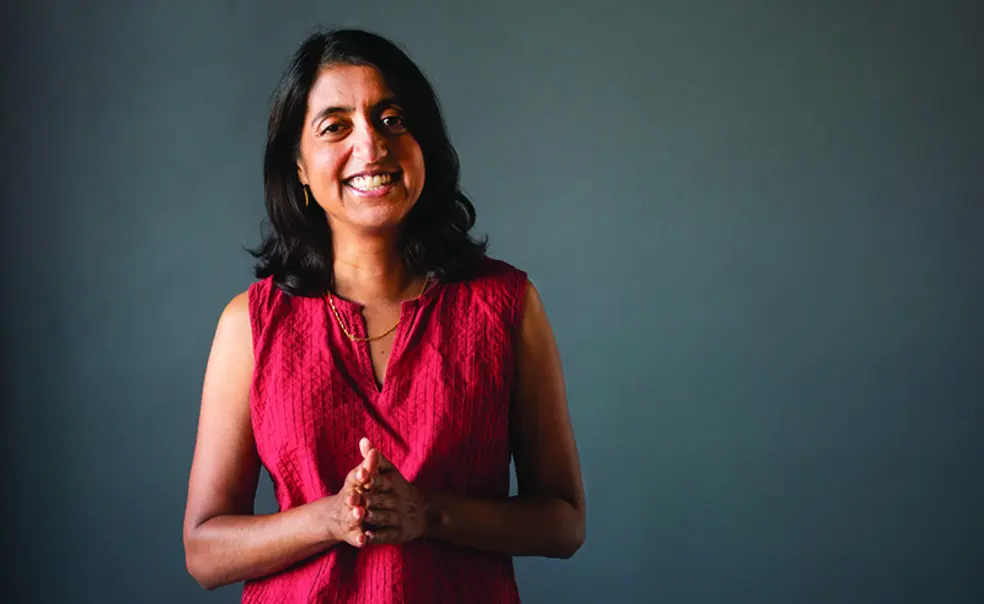Princeton Economics Lab Seeks to Reduce Global Poverty
J-PAL is addressing gender inequality, climate change, and more
Seema Jayachandran has always been drawn to economics for its applicability to the world’s biggest problems. “There are just a ton of important, pressing problems in developing countries,” says Jayachandran, a professor of economics and public affairs at Princeton who joined the faculty in the summer. “And I think the beauty of development economics [is that] the economic frameworks and other empirical methods are incredibly flexible to answer a bunch of questions. If someone’s passionate about gender equality, for example, they can apply them to that.”
Tackling these global issues is exactly what Jayachandran does through her work with the Abdul Latif Jameel Poverty Action Lab (J-PAL), where she serves as chair of the gender unit. Jayachandran first heard of the then-newly-formed J-PAL in the early 2000s while earning her Ph.D. in economics from Harvard and working under the tutelage of MIT’s Michael Kremer. Kremer and two fellow MIT professors, Abhijit Banerjee and Esther Duflo, founded the lab to do research that would show ways to reduce global poverty.
“One of the beauties of randomized experiments is that they’re pretty simple to understand: We have a treatment group that has a program, and a control group that doesn’t, and we can look at the averages, make a simple bar chart, and show that to a policymaker,” Jayachandran explains. “Hopefully that makes it more compelling for a government official to say, ‘Hey, I understand that. That works. I’m willing to try it.’ Because they’re not going to read our academic articles.”
J-PAL has now grown into a research hub of nearly 300 affiliated professors at universities around the world, and in 2019 Kremer, Banerjee, and Duflo were awarded the Nobel Prize in Economics for their innovative approach.
“There’s lots of shared resources — whether that’s fundraising, staff that can help out, or infrastructure,” says Jayachandran, noting that Princeton has a robust network of J-PAL–affiliated professors and Ph.D. students, all of whom are eligible for J-PAL’s funding and other resources.
J-PAL has formed strong relationships with local governments around the world, creating a synergy between researchers and policymakers that helps tackle big issues. For example, J-PAL learned in 2011 that government officials from the Indian state of Haryana were interested in addressing its serious gender inequality, which was contributing to a host of problems, including reduced economic output. “It’s one of the states that has the most skewed sex ratio, meaning the number of boys born is much higher than the number of girls because people want to have sons,” says Jayachandran, explaining that female fetuses were often aborted.
Haryana already had policies in place to address the issue — mainly financial incentives for having girls — but Jayachandran had a new approach to suggest.
“I said, ‘You won’t see the same immediate benefits, but we’re going to try to change people’s attitudes, so it’s not as important to them that they have sons rather than daughters, and you won’t need financial incentives or other policies because people, in their heart of hearts, will be happy to have daughters.’”
The government in Haryana was game, so Jayachandran teamed up with a nonprofit called Breakthrough to develop and implement at local high schools a new curriculum aimed at elevating the status of girls and women by encouraging students to reflect on culturally embedded gender norms. In one session, for example, students were asked about daily chores, and many believed women are better suited for tasks like cooking at home. A facilitator may challenge that notion by asking why men are the cooks in restaurants. The point is to have students think deeply about whether these beliefs are fair to women and good for society, Jayachandran adds.
The curriculum has been a success, Jayachandran says, noting that while it’s still too early to collect statistics regarding sex ratio, preliminary evidence showing students’ changing gender attitudes has been enough to convince other Indian states, including Punjab, to implement the curriculum and, in some cases, to scale it up to include sixth- through 10th-graders.
“The Poverty Action Lab has a big policy team that reaches out to policymakers to disseminate evidence,” says Jayachandran. “It’s nice to have these counterparts who have the skill sets not just to generate this evidence in an academic journal, but also to actually reach the people who can scale it up to hundreds of thousands of kids.”
Going forward, Jayachandran says, J-PAL will be targeting climate change, an issue she believes economists have been slow to address. “There’s a ton of evidence that climate change is going to cause the worst harm for developing countries, partly because they’re hot to begin with, but also because the people are vulnerable.”












No responses yet